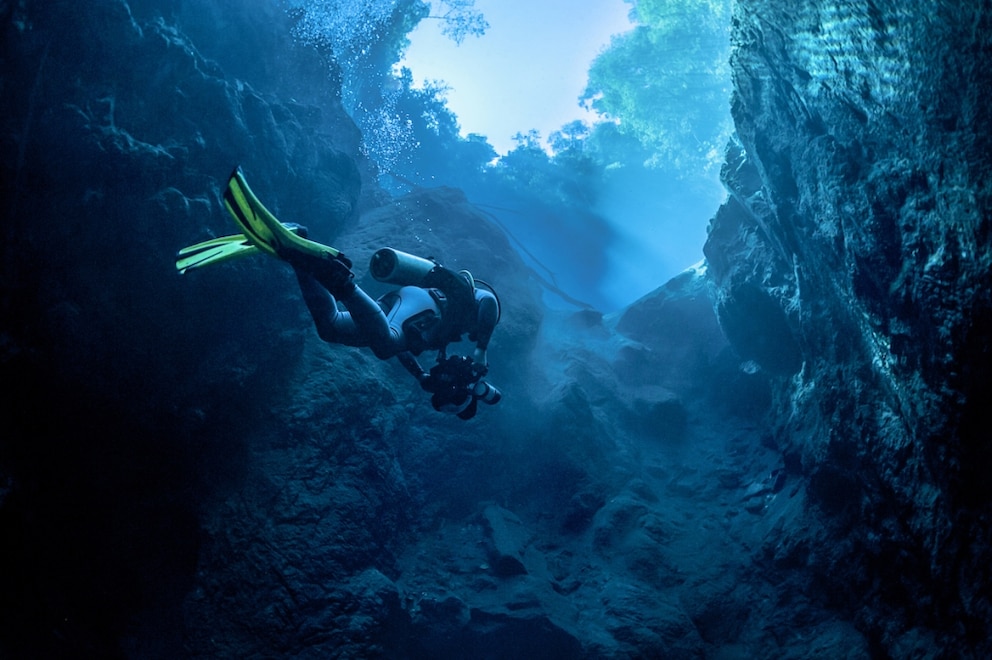September 19, 2024, 3:33 pm | Read time: 3 minutes
Many people associate their long-awaited vacation at a diving paradise with crystal-clear water and a colorful underwater world to discover. But beware! Diving just before flying can be dangerous. TRAVELBOOK explains why.
Flying is an extraordinary experience for the human body. You travel in a metal tube under enormous pressure, at a humidity lower than in the Sahara, at a speed of almost 621 miles per hour, and at an altitude of up to 39,370 feet above sea level. Diving, where the body has to withstand the pressure of enormous masses of water, is just as impressive. Many people fly thousands of miles to experience some of the best dive sites in the world. An experience where you can explore underwater worlds, encounter marine life, and experience the ocean’s beauty without gasping for air is at the top of many people’s bucket lists. However, there is an important warning for travelers: Diving before a flight can be dangerous.
Diving before a flight
When diving, compressed air is breathed underwater, which has a different effect on the body than breathing at sea level. It is a misconception that divers breathe pure oxygen from a tank – divers use normal air, like the air above water, which usually consists of 21 percent oxygen and 79 percent nitrogen. When divers breathe compressed air at depth, the nitrogen dissolves in their blood and tissues due to the increased pressure underwater. The pressure increases by approximately 14.5 psi for every 33 feet of depth. The deeper and longer the dive, the more nitrogen the body absorbs.
When a diver finally rises to the surface, the pressure drops, and the nitrogen gases begin to leave the body. This process is generally slow and controlled. However, it is to be expected that there will be “silent bubbles” in the bloodstream and tissues after each dive. After diving, it usually takes more than 24 hours to reach a new equilibrium between the internal gas and the ambient pressure. After an intensive diving vacation with many dives, the tissue can take up to 72 hours to completely release the residual nitrogen. However, if you go diving shortly before a flight, the bubbles can expand dangerously due to the difference in altitude and the reduced cabin pressure in an airplane. This can lead to a condition known as decompression sickness (DCS) or diver’s sickness.


Important information Traveling with heart disease – what those affected should bear in mind

Flying with the whole family Tips to overcome the fear of flying in children

Exciting questions and answers What you definitely didn’t know about airplanes
Symptoms of decompression sickness
Decompression sickness manifests itself in a number of symptoms. These can include joint pain, dizziness, numbness, tingling, headaches, chest pain, and even difficulty urinating or breathing. In severe cases, DCS can be life-threatening. The severity of DCS depends on the depth and duration of the dive, the number of dives, the diver’s physical condition, and how quickly the diver flies after diving.
To minimize the risk of decompression sickness, divers should follow the established guidelines for flying after diving. The Divers Alert Network (DAN) and other diving organizations, such as the Professional Association Of Diving Instructors (PADI), recommend certain time intervals between the last dive and flying. The general rule is to wait at least 12 to 18 hours after a single dive and 18 to 24 hours after multiple dives or decompression dives before taking a flight. This gives the body enough time to eliminate excess nitrogen. To be on the safe side, a 24-hour surface interval after diving and before flying is ideal. You should also ensure you drink enough fluids, as water helps the body excrete nitrogen. If you notice any symptoms of DCS, you should see a doctor immediately.

